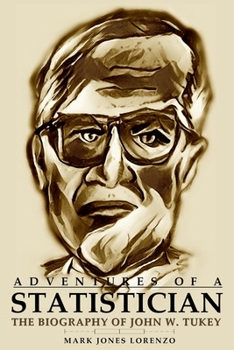Adventures of a Statistician: The Biography of John W. Tukey
Meet John W. Tukey, one of the most consequential statisticians and original thinkers of the twentieth century. Growing up one hundred years ago in New Bedford, Massachusetts, a large coastal town primarily known for its commercial fishing and textile industries, John Wilder Tukey quickly showed himself to be a child prodigy. The son of educated parents whose high school classmates voted them most likely to give birth to a genius, he learned to read on his own by three years of age, mastered using a hand-crack desk calculator to speed up arithmetical calculations shortly thereafter, and was poring through technical journals in the New Bedford Free Public Library by the time he was a teenager. Homeschooled until being admitted to Brown University, Tukey majored in chemistry there--even as he spent countless hours in the university library compiling lists of statistical techniques on index cards, simply because he found them interesting and useful. With multiple degrees in hand, Tukey's next stop was Princeton University, where his interests shifted to mathematics. After earning a doctorate in topology, an especially abstract branch of mathematics, Princeton retained him as a lecturer. But with the United States poised to enter World War II, Tukey joined the Fire Control Research Office (FCRO), where he was exposed to a set of life-and-death problems that bore little resemblance to abstract mathematics: namely, calculating the trajectories of artillery and ballistics and the motions of rocket powder, working with stereoscopic height and range finders, and improving the Boeing B-29 Superfortress bomber. With the stakes never higher, a chance encounter during the war with a fellow polymath and unconventional thinker twenty years his senior set the course for the rest of Tukey's professional life--as well as changing the field of statistics forever. In "Adventures of a Statistician," author Mark Jones Lorenzo chronicles John Tukey's life and times, from his decades spent at Princeton as a teacher and administrator and also at AT&T's Bell Laboratories as a scientific generalist; to his development of the fast Fourier transform (FFT) algorithm, which launched a revolution in digital signal processing; to his innovative ideas in displaying and summarizing data, such as with the intuitive stem-and-leaf plot and the interactive graphics of the PRIM-9 computer system; to his creation of exploratory data analysis, an approach to performing statistics he equated with "detective work"; to his intellectual war with sex researcher Alfred Kinsey over appropriate kinds of statistical sampling; to his productive yet sometimes strained relationships with fellow statisticians such as Ronald Fisher, George Box, and Erich Lehmann; to his enlightening friendship with the legendary physicist Richard Feynman; to his mentoring of dozens of doctoral students, many of whom went on to have highly successful careers in their own right; to his inventive use of language, having coined words like "bit"; to his development of sophisticated mathematical methods to detect underground nuclear explosions; to his groundbreaking work on the jackknife, multiple comparisons, robustness, and many other statistical techniques; and to his accomplishments in health and environmental regulation, U.S. census analysis, election forecasting, and public policy, among a host of other significant and impactful achievements. Nearly a decade in the making, "Adventures of a Statistician" is more than just the complete biography of John W. Tukey, perhaps the most revolutionary applied statistician of the past century. It's also a fascinating intellectual journey through the recent history of statistics as well.
Format:Paperback
Language:English
ISBN:1722013583
ISBN13:9781722013585
Release Date:August 2018
Publisher:Createspace Independent Publishing Platform
Length:342 Pages
Weight:1.01 lbs.
Dimensions:0.7" x 6.0" x 9.0"
Customer Reviews
0 rating





